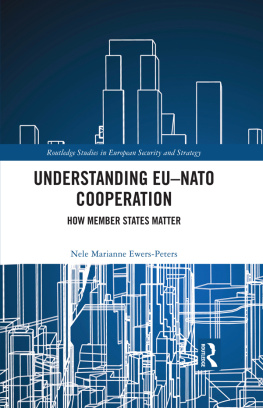European Union Military Operations
This book offers an in-depth study on the deployment of military operations in the framework of the European Unions Common Security and Defence Policy (ESDP/CSDP).
While existing studies of the subject are either descriptive or focused on a single level of analysis, this book incorporates factors from three different levels of analysis to explain the deployment of ESDP military operations. First, the international level, where the emergence of events that threaten certain values held dear by EU member states, catalyses the process leading to an operation; second, the national level, where the member states formulate their initial national preferences towards a prospective deployment based on national utility expectations; and third, the EU level, where the member states come to negotiate and seek compromises to accommodate their different national preferences towards a deployment. The strength of this multi-level collective action approach is demonstrated by four in-depth military case studies, which analyse the preference formation of France, Germany, and the UK towards the deployments of Operation Althea in Bosnia and Herzegovina, Operation Artemis and EUFOR RD Congo in the Democratic Republic of the Congo (DRC), and Operation Atalanta off the coast of Somalia, respectively. The author draws on a wealth of primary sources, including over 50 semi-structured interviews conducted with national and EU officials during 201115, and provides an up-to-date overview and critique of the existing theoretical literature on the deployment of ESDP/CSDP military operations.
This book will be of much interest to students of European security, EU politics, military and strategic studies, and International Relations in general.
Niklas I.M. Novky is a Research Officer at the Wilfried Martens Centre for European Studies and holds a PhD in International Relations from the University of Aberdeen, UK.
Routledge Studies in European Security and Strategy
Series Editors: Sven Biscop
Egmont Royal Institute for International Relations, Belgium
and
Richard Whitman
University of Kent, UK
The aim of this series is to bring together the key experts on European security from the academic and policy worlds, and assess the state of play of the EU as an international security actor. The series explores the EU, and its member states, security policy and practices in a changing global and regional context. While the focus is on the politico-military dimension, security is put in the context of the holistic approach advocated by the EU.
The EU and Military Operations
A comparative analysis
Katarina Engberg
The EU and Effective Multilateralism
Internal and external reform practices
Edited by Edith Drieskens and Louise van Schaik
EU Foreign Policy and Crisis Management Operations
Power, purpose and domestic politics
Benjamin Pohl
EU Foreign Policy, Transitional Justice and Mediation
Principle, policy and practice
Laura Davis
The European Defence Agency
Arming Europe
Edited by Nikolaos Karampekios and Iraklis Oikonomou
EU Security Policy and Crisis Management
A quest for coherence
Nicole Koenig
The EU, Strategy and Security Policy
Regional and strategic challenges
Edited by Laura Chappell, Jocelyn Mawdsley and Petar Petrov
EUUS Cooperation on Internal Security
Building a Transatlantic Regime
Dimitrios Anagnostakis
EU Security Strategies
Extending the EU System of Security Governance
Edited by Spyros Economides and James Sperling
European Union Military Operations
A Collective Action Perspective
Niklas I.M. Novky
First published 2018
by Routledge
2 Park Square, Milton Park, Abingdon, Oxon OX14 4RN
and by Routledge
711 Third Avenue, New York, NY 10017
Routledge is an imprint of the Taylor & Francis Group, an informa business
2018 Niklas I.M. Novky
The right of Niklas I.M. Novky to be identified as author of this work has been asserted by him in accordance with sections 77 and 78 of the Copyright, Designs and Patents Act 1988.
All rights reserved. No part of this book may be reprinted or reproduced or utilised in any form or by any electronic, mechanical, or other means, now known or hereafter invented, including photocopying and recording, or in any information storage or retrieval system, without permission in writing from the publishers.
Trademark notice: Product or corporate names may be trademarks or registered trademarks, and are used only for identification and explanation without intent to infringe.
British Library Cataloguing in Publication Data
A catalogue record for this book is available from the British Library
Library of Congress Cataloging in Publication Data
A catalog record for this book has been requested
ISBN: 978-1-138-10479-2 (hbk)
ISBN: 978-1-315-10203-0 (ebk)
Typeset in Times New Roman
by Wearset Ltd, Boldon, Tyne and Wear
To my wife Neva,
for all her love and support
Preface
I did not initially plan to write this book. Back in 2010 when I began my doctoral studies at the University of Aberdeen, my original idea was to write my thesis on burden sharing in the context of military operations launched in the framework of the European Unions (EUs) Common (formerly European) Security and Defence Policy (ESDP/CSDP). The subject of burden sharing interested me because I wanted to make sense of how EU member states shared the burden of conducting military operations, often in regions in which few if any of them have had clear interests at stake. Thus, I spent the first year of my doctoral studies conducting research on the subject, and even presented a paper containing some early and unrefined ideas on it at a workshop at the JMCE Research Student Workshop at Kings College London in September 2011.
Over time, however, I became increasingly interested in the more fundamental question of why the EU deploys military operations in the first place. There were at least three different reasons for this. The first was that it had never happened before in the long history of international relations that an actor that began its life as a regulator of coal and steel production among its members eventually created a capability to deploy military force. I had always been taught during my undergraduate and postgraduate studies that, in addition to states, military force can only be used by alliances, such as the North Atlantic Treaty Organization (NATO), or international organisations created specifically for ensuring peace, such as the United Nations (UN). Thus, as a military actor, the EU seemed completely different to other actors that have traditionally used military force. The second reason was that the deployment of military operations seemed to be at odds with what I had learned about the EUs normative power self-image. Since normative power, as conceptualised by Ian Manners, the concepts inventor, is about influencing others through the attractiveness of ones norms and values, it seemed odd to me that an actor that was said to take pride from being such a power would feel the need to develop a capacity to use force. This was especially the case because military power could almost be considered to be the polar opposite of normative power. The third reason was that, at the time when I began working on it, no one had yet tackled the subject of the deployment of EU military operations comprehensively. Although scholars such as Stle Ulriksen, Catriona Gourlay, Catriona Mace, Catherine Gegout, and Alexander Mattelaer among others had published papers on the subject, there were yet no book-length studies available on it in the market. Since, then, however, Hylke Dijkstra, Benjamin Pohl, and Katarina Engberg have all published excellent books on the subject, which have significantly improved our understanding of the factors that contribute to the EUs decision to launch operations. They also helped me when writing this book, for which I am very grateful. Thus, although this is no longer the first book on the deployment of EU operations, I hope that it will provide something new to those readers who are already familiar with the work of Dijkstra, Pohl, and Engberg.













